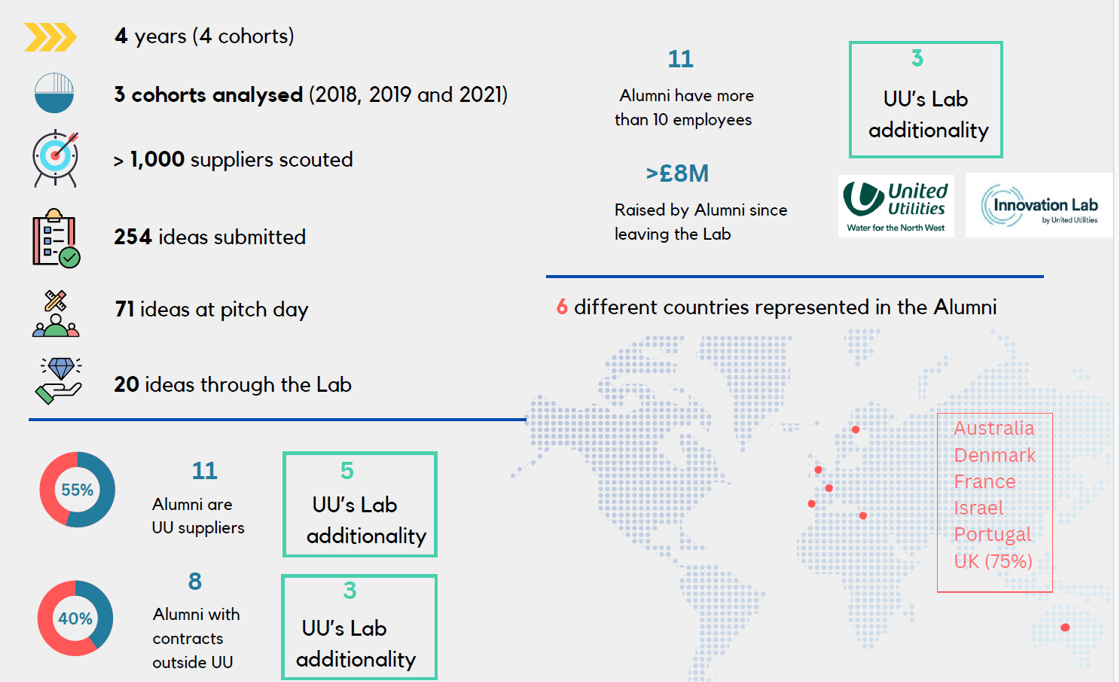Safety and stability are essential for public utilities. But they face pressure to innovate to keep up with technological innovation, environmental threats and consumer demands. Can they move fast without breaking things? Juanita Gonzalez-Uribe and Robyn Klingler-Vidra studied open innovation programmes undertaken by United Utilities, which serves England’s north-west. They found that UU’s approach unlocks employee talent, attracts start-ups as partners and ignites a culture of innovation across the organisation.
In the realm of corporate innovation, regulated utilities often languish at the bottom of the ladder. Imagine them as colossal beasts, burdened by red tape and shackled by regulatory demands. Yet, the call for innovation in this sector is deafening. Faced with environmental threats, technological progress, and evolving consumer demands, utilities stand at a crossroads: innovate or wither away. The question is not whether they should innovate, but rather how to navigate the paradox of moving fast without breaking things.
Enter United Utilities, a public utility serving England’s Northwest. Responsible for water and wastewater services to millions of homes and businesses, United Utilities operates in a realm were caution reigns supreme. The idea of innovation clashes with the industry’s bedrock of reliability and stability. Yet, the need for innovation is undeniable, from tackling leaks to boosting operational efficiency and safeguarding the environment. Under the leadership of Kieran Brocklebank, Head of Innovation, United Utilities has embarked on a bold journey towards open innovation with a series of programmes designed to unlock employee talent and attract new entrants to the water sector.
Learning from others and learning by doing
United Utilities has embraced collaboration as a driver of change. Since 2018, the company has partnered with L Marks, an innovation specialist enabling open innovation programmes in organisations operating across Europe, Asia, and North America.
Together, United Utilities and L Marks have co-created a comprehensive end-to-end procurement process, igniting a culture of innovation within the organisation. At the heart of this initiative lies the Innovation Lab, functioning as a themes-based corporate accelerator. It conducts an annual 14-week immersion programme within Kieran’s team, welcoming participants identified through a joint evaluation process by UU and L Marks. L Marks handles the initial applicant scoping for each theme proposed by Kieran’s team and invites submissions, while UU internally assesses all applicants, selecting a long list of companies for Pitch Day. During Pitch Day, invited applicants present their ideas and undergo interviews with Kieran’s and L Marks’ team to explore the business concept and programme fit.
The Innovation Lab serves not only as an idea generator but also as a hub for continuous improvement. Initially, Lab 1 used a categorisation system, selecting top applicants from each category for further consideration. However, this approach proved ineffective due to variations in quality across categories. Consequently, the selection criteria were refined to ensure that the most promising candidates in any theme advanced. In Lab 4, further adjustments were made to specify that only companies scoring above 65 per cent could progress to Pitch Day, with a maximum of eight suppliers being selected. Throughout these iterations, maintaining flexibility while adhering to procurement regulations remained paramount. Fast-forward to Lab 5 in 2023, United Utilities and L Marks re-imaged selection processes again. This included applications being submitted to L Marks, who helped verify eligibility in terms of solvency and other quality indicators.
From sandboxes to live testing
While some praise open innovation programmes as a solution for corporations grappling with rapid technological advancements beyond their organisation, others criticise them as mere “innovation theatre.” What distinguishes United Utilities’ Innovation Lab is its commitment to fostering experimentation. The Lab provides access to various sandbox environments, including test facilities and “rigs,” where participants can conduct proof of concept (PoC) tests and small-scale prototyping. Additionally, it offers the innovative opportunity of live testing, particularly beneficial for companies with technologies in advanced development stages. Combined with frequent feedback from United Utilities’ experts and end users, this allows participants to scale up their innovations to a minimum viable product (MVP), test them in real-world conditions, and eventually roll them out on a larger scale.
The significance of live testing cannot be overstated. It is crucial for de-risking the adoption of new technologies by United Utilities, as adoption only occurs when “proven in a live network, not just in a sandbox”. Consequently, testing and trialling activities consume a substantial portion of Kieran’s time and 90 per cent of his budget. Access to live testing opportunities outside United Utilities’ Innovation Lab is limited, explaining why many start-ups apply to this programme and eagerly participate as suppliers.
To embed or not to embed?
One of the criticisms levelled against open Innovation programmes is the perceived risk of idea theft and talent poaching, particularly for participating start-ups. The concern is that corporations may use these programmes primarily for marketing and talent acquisition, rather than genuinely fostering innovation and supporting the start-ups involved.
To address this criticism and mitigate potential conflicts of interest, many business units maintain a distance from their open innovation initiatives at the risk of losing out on the potential strategic value that embedding would bring.
United Utilities’ Innovation Lab is embedded within the innovation team, which interacts with numerous functions across the company. This includes individuals from across the organisation contributing to theme proposals for the Lab, assisting in applicant selection during pitch day, and engaging with participants throughout the programme. The widespread participation—rather than only engineering, marketing, etc.—in the Labs means that they foster an innovative culture across the organisation and, equally, it gives participating innovators access to “the person” responsible for key issues they are facing when interacting with large firms. Kieran Brocklebank describes the process as these suppliers being brought “inside the firewall”, as they are given frontline exposure to the real issues that a client (UU) faces every day.
The close interaction between United Utilities and its Innovation Lab significantly enhances participants’ ability to secure commercial partnerships with the company. Data collected by Kieran and his team support this, demonstrating the effectiveness of this integrated open innovation approach. During the sample period spanning 2018 to 2021, more than 50 per cent of the companies that participated in the Lab had established commercial partnerships with United Utilities by 2023. Notably, no new partnerships involved ideas developed internally without the involvement of the applicant venture, highlighting the mutual benefits derived from this collaborative model.
Measuring the power of open innovation
Assessing the true impact of an open innovation programme is no easy feat. While it’s clear that these initiatives can generate creative output, quantifying their tangible effects presents several challenges. First, the corporate aims need to be clearly articulated. For UU, Kieran explains that it has four core aims for the programme: (1) finding more suppliers, (2) encouraging more employees to engage, (3) accelerating idea adoption and (4) sharing the UU innovation story.
As these aims reflect, open innovation programmes often yield multidimensional impacts that extend beyond the confines of the organisation. Developing KPIs to evidence progress against the different objectives has its challenges. For instance, many programme applicants are in the early stages of development, lacking comprehensive financial records, which makes change in employees and revenue difficult to evidence. They are also highly selective programmes with few participants, complicating statistical work. Thwarting matters further, determining counterfactuals—what would have transpired without the programme—is inherently murky.
But these challenges are not insurmountable. In a further testament of the power of open innovation, we collaborated with UU and L Marks for an academic evaluation that offers promising insights into performance against UU’s aims. We extended research methods we developed to analyse the impact of investor-startup interactions on startup performance. Leveraging proprietary data from applicants to the 2018, 2019, and 2021 Labs, we traced their progress over an average period of 3.5 years post-application using data from various programme, administrative and web-based sources. To establish counterfactuals, participants were matched with rejected applicants from the same cohort, location, and similar application scores, who also participated in the pitch day.
The preliminary assessments of UU’s Innovation Lab indicate a positive correlation between programme participation and supplier performance. In particular, our analysis reveals that Lab participation is associated with accelerated growth, particularly among foreign applicants. Pitch Day participants who were not selected still showed a greater propensity to achieve high growth compared to similar rejected applicants, even after controlling for cohort, business age, and location. These preliminary findings underscore the potential for broader impacts of the Lab beyond its direct participants, suggesting that even unsuccessful applicants can benefit from engaging in the process, especially the connections made, and feedback received during Pitch Day. In this sense, we observed similar effects in our related research examining the impact of seed funds’ due diligence on applicants considered for investment but ultimately rejected by the investor.
Innovating together for the public good
In conclusion, United Utilities’ journey in open innovation illustrates the transformative potential of collaboration, adaptability and forward-thinking within the public utility sector. By breaking away from traditional norms and embracing open innovation, United Utilities has not only bolstered its own resilience and competitiveness but also spearheaded positive change in communities and the environment. As the utility sector navigates the challenges of the 21st century, programmes like the Innovation Lab at United Utilities stand as a model of innovation’s power to effect meaningful and lasting change within the organisation, for a wider set of start-ups, and for regional development. Collaborations with academics can further elucidate the impacts of open innovation, shedding light on how to navigate tensions to deliver progress.
Figure 1. United Utilities’ Innovation Lab successes

- This blog post represents the views of the author(s), not the position of LSE Business Review or the London School of Economics and Political Science.
- Featured image: members of United Utilities Innovation Lab inspecting a drone. Not under Creative Commons. All Rights Reserved © United Utilities.
- When you leave a comment, you’re agreeing to our Comment Policy.





